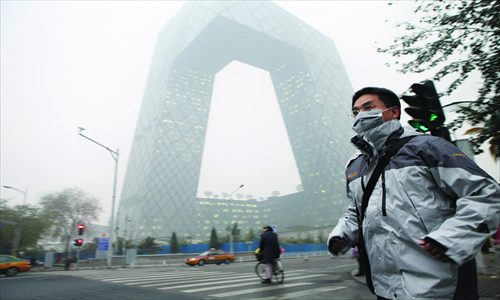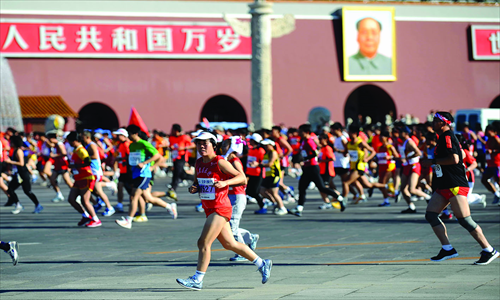Running a risk


Five days before the Beijing Marathon, the air pollution level in Beijing was rated "very unhealthy" by the US Embassy, and buildings in the distance appeared obscured by haze.
Nonetheless, about 30,000 runners are gathering in the city on Sunday to run the race starting in Tiananmen Square, snaking through the city and eventually reaching the Olympic village and crossing the finish line at the "Bird's Nest" National Stadium.
Despite an awareness of pollution levels in Beijing, many runners are not worried enough to stop them from taking part, feeling the immediate and concrete benefits of running outweigh the abstract potential risk.
"If I referred to the [pollution] index every day, then there would be very few days that I would go outside to run," says Zhang Suhai, 44, who is running in Sunday's marathon for the first time. Nonetheless, Zhang says he does refer to the air pollution index using his mobile phone app, a habit shared by many local runners.
"I do care about the air quality and if the air pollution is serious, I will stay at home or jog with a mask or handkerchief."
Neil Fraser, a 25-year-old Englishman living in Beijing who takes part in weekly runs organized by the Beijing Hash House Harriers, says he personally has never had a problem with pollution here and doesn't wear a mask. But he adds, "The running community in general is very aware of pollution levels. They check their iPhone apps [for pollution] and some wear masks when it's particularly bad."
He says he has noticed that when pollution is bad, "Westerners tend to stay away from outdoor training and wear protection [face masks], but the Chinese don't seem to really mind and go on as usual."
Weighing the risks
Deciding whether running is too dangerous or not is tough, because there is very little concrete information or clear advice available. Running feels great, and the long term risk is tough to quantify.
During the course of Metro Beijing's research for this article, three doctors declined to voice their opinions "on the record" concerning the quality of air in Beijing and whether it was a potential risk for this year's marathoners.
When asked Monday whether it was safe to "exercise outside," the Beijing Municipal Environmental Monitoring Center requested Metro Beijing fax our enquiries. It did not reply.
Even getting reliable data on air quality can be tough. Before this year, Beijing did not release air pollution data for the most dangerous particles, particulate matter in the atmosphere that measure less than 2.5 micron in diameter, abbreviated as PM2.5.
Because particles of dust and dirt this size are so tiny, they can penetrate the furthest corners of the lungs.
The main sources of PM 2.5 are automobile exhaust, chemical plants and roadway dust, according to Wang Qian, a monitor with the Shanghai Environmental Monitoring Center. This, he said, is why when there is a lack of wind the particles fail to disperse and a buildup of thick smog is palpable.
When this article went to press, the official Beijing Municipal Environment Monitoring Center PM2.5 air quality index had a null reading.
A reading from the US Embassy's air quality index was 235, which indicates "very unhealthy." The website www.aqicn.info, which compiles official and US Embassy readings, had what it called a "moderately unhealthy" measurement of 214.
"The increasing density of PM 2.5 is closely linked with the increase of death rates caused by respiratory diseases," says Dr Sun Yongchang, a general practitioner at the Beijing Tongren Hospital. "It is also closely linked with the increasing number of patients who frequent our respiratory departments. This therefore proves that PM 2.5 can cause chronic respiratory diseases."
Seize the day
For 26-year-old Liu Yan, a copywriter from Shandong province who is running in this Sunday's marathon, the potential for respiratory problems later on in life is something she doesn't seem to be worried about. "I am concerned with the air quality in Beijing, and I have the app for PM 2.5 on my mobile phone. But the air won't get better [even] if I don't go running. Running makes me feel better and happier." Liu says she is looking forward to this year's marathon, having trained hard for the event.
Beijing resident Michael Royston, 27, said training for a marathon has been mostly "pleasant," but added that there were times when he would jog over a pedestrian bridge and think twice about the quality of air he was breathing in. He said that it was difficult to assess what the actual health risks were.
I quit
Jacqueline Wong, Singaporean living in Shanghai, decided running in this year's marathon was not worth it because of the health risks.
She says her aunt, who lives in Beijing, sharply told her, "Running in 5 degrees temperature with 214 [very unhealthy] air quality - I don't know what that is supposed to prove."
The organizers, she says, will "partially refund" the $40 entrance fee for the race.